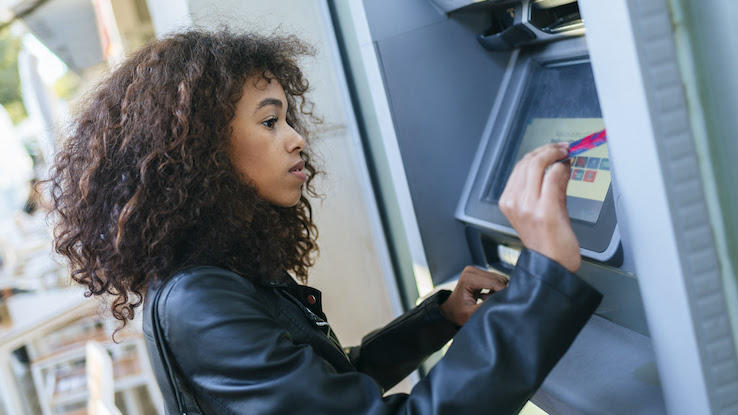Do Yearback Student Give Fees Again

When yous're opening upwards a new bank account, at that place are plenty of things to think about, from the business relationship's involvement rate to the bank's online features to the convenient locations of local branches. But it's also essential to understand how a bank's policies could bear upon your finances, particularly because you lot might find out that they're deal breakers — afterwards you've already opened an account. Ofttimes, banks have unexpected fees, like maintenance charges and overdraft fees, that can quickly add up if you aren't careful.
Whether or non yous run into these fees and charges depends on the types of accounts you lot have with your bank and how you use those accounts. Nevertheless, there are several common fees and charges yous're likely to encounter at most banks. We're taking a look at viii types of fees and charges that y'all might experience while managing a banking concern account, along with how they work and what you tin do to avoid them.
Some Banks Charge Monthly Maintenance Fees for Accounts

A mutual bank charge for checking or savings accounts is a monthly maintenance fee. These are essentially service fees, meaning y'all're paying the bank a minor corporeality for the privilege of keeping an business relationship open up and to comprehend administrative tasks tellers perform in relation to the account. Typically, these fees vary from as little as $half dozen to as much every bit $15 per month. Often, you tin can avoid maintenance fees simply by keeping a certain amount of money in the account or by receiving regular direct deposits.
For example, say the bank levies a monthly service charge of $viii.95 for the use of a checking account, a debit menu and access to the bank'southward branches and ATMs. However, the banking concern waives that fee if you keep at least $300 in the account or make a monthly deposit of at least $250.
Y'all May Have to Pay Fees to Use Out-of-Network ATMs

Banks typically charge fees to apply their ATMs if you're non a customer. Those fees often range from $2 to $5 for each transaction, depending on the bank. You can avert these fees by finding an ATM in your bank'southward network nigh your current location instead of opting to use an ATM that might be more conveniently located.
Online, banks accept fabricated it easier to detect the locations of branches with the services yous may need. However, sometimes you might not exist able to avert using some other bank's ATM to withdraw funds. Merely try not to arrive a habit; those pocket-sized fees can add up!
Overdraft Fees May Be a Part of Your Depository financial institution's Policy

When you don't accept enough money in your checking or savings business relationship to comprehend a transaction, banks tin pay for the transaction on your behalf to help you avoid a belatedly payment (or no payment at all). This is called overdrafting your account, and you lot'll normally accept to pay an overdraft fee if your bank needs to cover the cost of a transaction.
Due to federal regulations, you lot take the option to opt in (or out) of a depository financial institution's overdraft protection program. However, keep the plan'south fee, which tin can toll about $35 per overdraft, in mind. Cheque your account balance prior to making transactions if yous think you lot might not have enough money in your account. And bank check your balances regularly to stay on pinnacle of your cleared transactions, particularly if some of your bills are paid automatically.
Fees for Bereft Funds in Your Bank Account Are Common

The term non-sufficient funds (NSF), and the similar insufficient funds, refers to a checking account that doesn't take enough coin to cover transactions. This term often applies when people write checks for amounts that their bank balances tin can't embrace.
Some people may utilize the terms "NSF" and "overdraft" interchangeably. The divergence is that, with an overdraft program, your bank pays the corporeality of the debit or check transaction your account rest doesn't cover. Even so, if you're not in an overdraft plan and you write a check that bounces, your banking company can reject to pay the check. You might so incur an NSF fee and likewise confront charges from the seller for the returned check. Either way, you're going to pay a fee. And then, information technology's better to upkeep your money to avoid NSF fees and any confusion with the banking company.
You May Face Charges to Close Your Bank Account Early

Many banks don't charge a fee to close an account. However, some banks may charge an early account closure fee if you shut your account soon after opening information technology. For example, a bank might charge a $25 fee if you shut an account within six months of opening it. Some banks levy these fees to keep people from opening accounts just to get special limited-time bonuses the banks may offer.
The best mode to avoid this fee is to actually do your enquiry on the banking concern you're choosing. Even if the bank does offer a bonus for opening an account, make sure the account has other features yous desire for the long-term, like loftier-yield savings.
Getting Paper Statements in the Mail May Cost You, As well

With so many banks offering online accounts these days, it's easy for customers to access their statements online through banks' website portals. This allows banks to relieve time and money when it comes to press and mailing paper statements. Still, if you lot prefer to receive a paper statement, a banking concern can notwithstanding send it…potentially for a price.
Banks are kickoff to accuse fees to print and send statements to customers. Depending on the size of the bank, these fees may range from $1 to $v or more per newspaper argument. Those newspaper statement fees can add upward, so it's better for your budget if you opt to access your statement online and print it out at home if y'all need a paper copy.
Some Banks Charge Inactivity Fees If You Don't Use Your Account

Another charge that y'all may come across on your account is an inactivity fee. If y'all have money sitting in the bank that you oasis't touched for months and yous haven't made other deposits, the bank may charge a fee each month. It's a fee that isn't ofttimes disclosed upfront but could price you somewhere between $5 to $20 each month the business relationship is inactive.
An like shooting fish in a barrel way to foreclose an inactivity fee is by making any blazon of deposit or withdrawal to an account you may not use often. You can set upwardly a small-scale automatic monthly transfer to the account to avert the fee, and this besides may allow you to build upward your savings.
Excessive Transaction Fees May Quietly Hitting Your Depository financial institution Account

An excess transaction fee is another fee that tin sneak upward on y'all. This typically applies to savings account holders who withdraw over the federal limit, which is six costless withdrawals and transfers per month. Excessive transaction fees often cost between $3 and $25 a month for each transaction you perform over the allowed number per savings account.
This can be a trouble if you regularly dip into your savings account to pay bills or cover other costs. Employ your checking account as your regular operating account for routine withdrawals to avoid these fees.
Source: https://www.askmoney.com/investing/common-bank-fees-charges-how-avoid?utm_content=params%3Ao%3D1465803%26ad%3DdirN%26qo%3DserpIndex

0 Response to "Do Yearback Student Give Fees Again"
Enviar um comentário